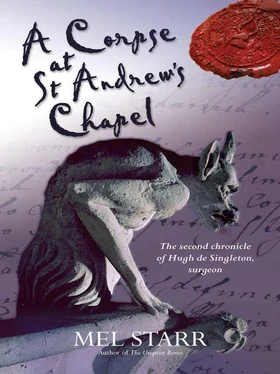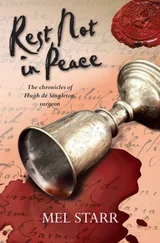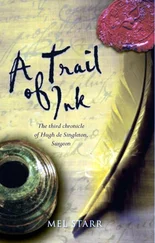Mel Starr - A Corpse at St Andrew's Chapel
Здесь есть возможность читать онлайн «Mel Starr - A Corpse at St Andrew's Chapel» весь текст электронной книги совершенно бесплатно (целиком полную версию без сокращений). В некоторых случаях можно слушать аудио, скачать через торрент в формате fb2 и присутствует краткое содержание. Год выпуска: 2010, Издательство: Kregel Publications, Жанр: Исторический детектив, на английском языке. Описание произведения, (предисловие) а так же отзывы посетителей доступны на портале библиотеки ЛибКат.
- Название:A Corpse at St Andrew's Chapel
- Автор:
- Издательство:Kregel Publications
- Жанр:
- Год:2010
- ISBN:нет данных
- Рейтинг книги:5 / 5. Голосов: 1
-
Избранное:Добавить в избранное
- Отзывы:
-
Ваша оценка:
- 100
- 1
- 2
- 3
- 4
- 5
A Corpse at St Andrew's Chapel: краткое содержание, описание и аннотация
Предлагаем к чтению аннотацию, описание, краткое содержание или предисловие (зависит от того, что написал сам автор книги «A Corpse at St Andrew's Chapel»). Если вы не нашли необходимую информацию о книге — напишите в комментариях, мы постараемся отыскать её.
A Corpse at St Andrew's Chapel — читать онлайн бесплатно полную книгу (весь текст) целиком
Ниже представлен текст книги, разбитый по страницам. Система сохранения места последней прочитанной страницы, позволяет с удобством читать онлайн бесплатно книгу «A Corpse at St Andrew's Chapel», без необходимости каждый раз заново искать на чём Вы остановились. Поставьте закладку, и сможете в любой момент перейти на страницу, на которой закончили чтение.
Интервал:
Закладка:
“Some men might,” Master John scowled, “but I am of the same mind. There is more to this matter than shoes. So now you seek one who killed a murderer?”
“Aye. But did such a one kill for revenge? Or, perhaps ’twas in error. Or did Henry atte Bridge die so as to silence him? Mayhap Henry had a partner in this business of Alan the beadle.”
Master John plucked a blade of grass and twisted it round his finger. “All these are possible…but I lean to silence.”
“As do I,” I agreed. “If Henry atte Bridge was shot down in error, the mistake was grievous, for I must be the only other target, and I was standing in the road, opposite the flight of the arrow. If revenge, then three must have been in the wood that night — Henry, the one he called to, who could have been no enemy seeking vengeance, and one unknown who struck him down.”
Wyclif unwound the grass from his fingers. “Doubtful, for if so it would mean there is another who knew of his attack on your beadle. Unless this Henry was so unloved there were others who wished him ill.”
“He was not admired, but I think none sought his life.”
“Someone did, and when you learn why Henry atte Bridge slew the beadle you will, perchance, discover who had reason to shed his blood.
“’Tis near time for supper,” Master John stood and stretched. “Will you dine with me this evening? New Canterbury Hall is of the new scheme…students make their abode in the college, and take their meals there also. There are merchants and landlords who dislike this new way, but the method prevents much trouble in the town.”
“I would have taken my supper at the Stag and Hounds.”
“Hah. So you will accept my invitation. I know the place well. Do you sleep there this night?”
“Aye.”
“There are empty cells at the college. Sleep here. You will awaken lousy at the Stag and Hounds.”
Master John did not need to beg me. I changed my lodging willingly.
Supper was but barley pottage and maslin, but the students partook enthusiastically. The conversation fell to a debate concerning the late king of France, John II, who had died a hostage in English custody the year before. He had been captured at Poitiers, and held for a great ransom, but was released so as to return to France and raise the funds. His son was to remain hostage in his place, but fled.
When King John learned of this he considered it a breach of honor and so placed himself in English hands again. King Edward’s brother kept him at the Savoy Palace, in London, where he died some months after his return. No Englishman had a hand in this death. Only living kings are worth a ransom.
Some students argued that the French king was foolish to return, others held that chivalry demanded it. I took no part in the dispute, but watched as Master John goaded his charges with questions or demolished ill-considered remarks with a word. Such conversation would not be a part of the discourse at the Stag and Hounds. Conversation there generally centered on the appearance and habits of the newest wench.
The long glow of a near-summer evening illuminated and warmed the west-facing wall of the cloister at Master John’s door. We sat, after supper, on a bench with our backs to the warm stones and spoke of various things. Our conversation had no special theme. It ranged from the weather, which we agreed was agreeable, to the old king and his new keeper of the privy seal, William of Wykeham.
Said William is an able man. This is good, for Edward is not remarked for wisdom even among those who defend his many virtues. There are nobles who despise William. They detest a peasant’s son at the king’s right hand. As darkness fell and the stones at our backs cooled we agreed that William’s counsel could be no worse than that of the barons and bishops. This conclusion was probably subversive and heretical, but the wall had no ears so our judgment carried with it no penalty.
I bid Master John farewell next morning after we shared a loaf warm from the college bakehouse.
“I trust,” he remarked, “you have found what you sought at Oxford.”
“Nearly so. I need to seek but one more thing before I leave the town.”
“Indeed; what is that?”
“When ended the business of the bones in Lord Gilbert’s cesspit I set my hand to write down the tale. Some day long hence perhaps a man will read of the affair while I wait in the churchyard for the Lord’s return. Now I am persuaded that this new matter of Alan the beadle must be recorded as well.” Master John nodded. “So I am come to Oxford to seek parchment and ink of Aelfred.”
“Ah…my pride is well rebuked. ’Twas my opinion brought you here, so I thought.”
“Your views mean much to me, but I admit, ’twas the parchment brought me to Oxford. Now I must go and beg Aelfred to sell me some of his precious supply.”
Aelfred the stationer had long been the bane of Baliol’s scholars and students. His shop was nearest to the college, on the High Street. If he disliked a master’s teaching, or the cut of a student’s gown, he would refuse to sell to him. Neither parchment nor vellum nor the ink to write upon them could be pried from his flinty grasp did he dislike the buyer. Those he displeased must purchase from another vendor. He seemed to like me well enough. He did not withhold when I offered to buy.
“Hah…you speak of Aelfred,” Wyclif chuckled. “He is not so particular now. He has a competitor.”
“Another stationer does business on the High Street?”
“Aye. Near enough. From Cambridge, ’tis said, although we do not hold that against him.”
“From Cambridge? What has brought him hither?”
“His father is a stationer there. And as Cambridge is not so great with students as Oxford, there is not enough custom for him to set up on his own, nor did he wish to steal his living from his father. So here he is, and has found good business, I think, for he sells to all with a smile.”
“That would indeed be a novelty.”
“If you seek his shop you will find it readily enough. ’Tis on the Holywell Street, but a short way from Baliol College. You will know the place from afar off for the students passing to and fro.”
“This new fellow has attracted much business, then?”
“Ah…well…I would not say he or his business is the attraction,” Wyclif smiled.
“You speak in riddles. I feel myself taken back to a lecture where you challenged us students with conjectures that would choke a bishop.”
“Choking bishops is a talent of mine. But fare you well, and may God grant you success in your endeavors.”
“May He, indeed,” I replied, and set off up Cornmarket Street for Baliol College and Holywell Street.
It was as Master John predicted. I was but a few steps past the gate to Baliol College when Broad Street straightened enough that I could see past Catte Street into the curve of Holywell Street. Two hundred paces or so before me I saw three black-gowned students milling about before a shop. As I watched and walked they took counsel of each other, threw back their adolescent shoulders, and disappeared inside the shop.
When I first entered the stationer’s shop I did not understand the reason for their manly display. The interior was dark, as the establishment was on the south side of the street and the shutters opened to the north. The slanting morning sun did not penetrate to the shaded corners of the business.
I envisioned the proprietor as a young man, setting out on business on his own, but the man who waited on the youths was middle-aged, and carried himself with the stiffness of old age. There was another figure in a dark corner of the shop, arranging bundles of parchment and vellum on a shelf. When this person turned toward me Master John’s words and the behavior of the students became clear.
Читать дальшеИнтервал:
Закладка:
Похожие книги на «A Corpse at St Andrew's Chapel»
Представляем Вашему вниманию похожие книги на «A Corpse at St Andrew's Chapel» списком для выбора. Мы отобрали схожую по названию и смыслу литературу в надежде предоставить читателям больше вариантов отыскать новые, интересные, ещё непрочитанные произведения.
Обсуждение, отзывы о книге «A Corpse at St Andrew's Chapel» и просто собственные мнения читателей. Оставьте ваши комментарии, напишите, что Вы думаете о произведении, его смысле или главных героях. Укажите что конкретно понравилось, а что нет, и почему Вы так считаете.












